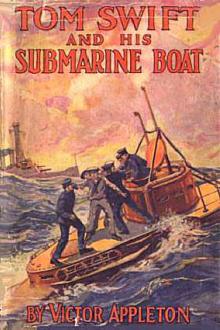Struggling Upward, or Luke Larkin's Luck, Jr. Horatio Alger [spiritual books to read txt] 📗

- Author: Jr. Horatio Alger
Book online «Struggling Upward, or Luke Larkin's Luck, Jr. Horatio Alger [spiritual books to read txt] 📗». Author Jr. Horatio Alger
"So am I, but it won't cripple me. Still, a man doesn't like to lose twenty-five thousand dollars and over."
"Was there as much as that in the box, sir?" asked Luke, in surprise.
"Yes, I don't know why I need make any secret of it. There were twenty-five thousand dollars in government bonds, and these, at present rates, are worth in the neighborhood of thirty thousand dollars."
"That seems to me a great deal of money," said Luke.
"It is, but I can spare it without any diminution of comfort. I don't feel, however, like pocketing the loss without making a strong effort to recover the money. I didn't expect to meet immediately upon arrival the only person hitherto suspected of accomplishing the robbery."
He smiled as he spoke, and Luke saw that, so far as Mr. Armstrong was concerned, he had no occasion to feel himself under suspicion.
"Are you intending to remain long in Groveton, Mr. Armstrong?" he asked.
"I can't say. I have to see Mr. Duncan about the tin box, and concoct some schemes looking to the discovery of the person or persons concerned in its theft. Have there been any suspicious persons in the village during the last few weeks?"
"Not that I know of, sir."
"What is the character of the men employed in the bank, the cashier and teller?"
"They seem to be very steady young men, sir. I don't think they have been suspected."
"The most dangerous enemies are those who are inside, for they have exceptional opportunities for wrongdoing. Moreover, they have the best chance to cover up their tracks."
"I don't think there is anything to charge against Mr. Roper and Mr. Barclay. They are both young married men, and live in a quiet way."
"Never speculate in Wall Street, eh? One of the soberest, steadiest bank cashiers I ever knew, who lived plainly and frugally, and was considered by all to be a model man, wrecked the man he was connected with—a small country banker—and is now serving a term in State's prison. The cause was Wall Street speculation. This is more dangerous even than extravagant habits of living."
A part of this conversation took place on the platform of the railroad-station, and a part while they were walking in the direction of the hotel. They had now reached the village inn, and, bidding our hero good morning, Mr. Armstrong entered, and registered his name.
Ten minutes later he set out for the house of Prince Duncan.
CHAPTER XXI — THE DREADED INTERVIEW
Mr. Duncan had been dreading the inevitable interview with Mr. Armstrong. He knew him to be a sharp man of business, clear-sighted and keen, and he felt that this part of the conference would be an awkward and embarrassing one. He had tried to nerve himself for the interview, and thought he had succeeded, but when the servant brought Mr. Armstrong's card he felt a sinking at his heart, and it was in a tone that betrayed nervousness that he said: "Bring the gentleman in."
"My dear sir," he said, extending his hand and vigorously shaking the hand of his new arrival, "this is an unexpected pleasure."
"Unexpected? Didn't you get my letter from London?" said Mr. Armstrong, suffering his hand to be shaken, but not returning the arm pressure.
"Certainly—"
"In which I mentioned my approaching departure?"
"Yes, certainly; but I didn't know on what day to expect you. Pray sit down. It seems pleasant to see you home safe and well."
"Humph!" returned Armstrong, in a tone by no means as cordial. "Have you found my box of bonds?"
"Not yet, but—"
"Permit me to ask you why you allowed me to remain ignorant of so important a matter? I was indebted to the public prints, to which my attention was directed by an acquaintance, for a piece of news which should have been communicated to me at once."
"My dear sir, I intended to write you as soon as I heard of your arrival. I did not know till this moment that you were in America."
"You might have inferred it from the intimation in my last letter. Why did you not cable me the news?"
"Because," replied Duncan awkwardly, "I did not wish to spoil your pleasure, and thought from day to day that the box would turn up."
"You were very sparing of my feelings," said Armstrong, dryly— "too much so. I am not a child or an old woman, and it was your imperative duty, in a matter so nearly affecting my interests, to apprise me at once."
"I may have erred in judgment," said Duncan meekly, "but I beg you to believe that I acted as I supposed for the best."
"Leaving that out of consideration at present, let me know what steps you have taken to find out how the box was spirited away, or who was concerned in the robbery."
"I think that you will admit that I acted promptly," said the bank president complacently, "when I say that within twenty-four hours I arrested a party on suspicion of being implicated in the robbery, and tried him myself."
"Who was the party?" asked the capitalist, not betraying the knowledge he had already assessed on the subject.
"A boy in the village named Luke Larkin."
"Humph! What led you to think a boy had broken into the bank? That does not strike me as very sharp on your part."
"I had positive evidence that the boy in question had a tin





Comments (0)